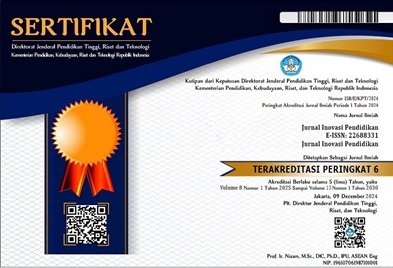PENGARUH MODEL PROBLEM BASED LEARNING DALAM MENINGKATKAN HASIL BELAJAR KOGNITIF PESERTA DIDIK PADA PEMBELAJARAN BIOLOGI DI MAN 1 SUMBAWA BARAT
Kata Kunci:
Model Problem Based Learning, Hasil Belajar Kognitif, Biologi, Sistem Ekskresi, Quasi EksperimenAbstrak
Penelitian ini bertujuan untuk mengetahui Pengaruh Model Problem Based Learning (PBL) dalam Meningkatkan Hasil Belajar Kognitif Peserta Didik pada Mata Pelajaran Biologi Di MAN 1 Sumbawa Barat. Permasalahan dalam pembelajaran biologi yang ditemukan di sekolah antara lain rendahnya hasil belajar, dominasi metode ceramah, dan kurangnya keterlibatan aktif peserta didik. Penelitian ini menggunakan pendekatan kuantitatif dengan desain quasi eksperimen berupa pretest-posttest control group design. Sampel penelitian terdiri dari dua kelas, yaitu kelas eksperimen yang menggunakan model PBL dan kelas kontrol yang menggunakan pembelajaran konvensional. Instrumen yang digunakan adalah tes hasil belajar kognitif yang telah divalidasi dan reliabel. Analisis data dilakukan menggunakan uji normalitas, homogenitas, dan independent sample t-test. Hasil penelitian menunjukkan bahwa terdapat perbedaan signifikan antara hasil belajar kognitif peserta didik yang menggunakan model PBL dibandingkan dengan pembelajaran konvensional, dengan nilai signifikansi sebesar 0,000 < 0,05 dan selisih rata-rata gain score sebesar 10,476. Dengan demikian, model PBL terbukti efektif dalam meningkatkan hasil belajar kognitif peserta didik pada materi sistem ekskresi manusia.
This study aims to determine the effect of the Problem-Based Learning (PBL) model on improving students' cognitive learning outcomes in biology subjects at MAN 1 Sumbawa Barat. The problems found in biology learning at school include low learning outcomes, the dominance of lecture methods, and the lack of active student involvement. This study employed a quantitative approach with a quasi- experimental design in the form of a pretest-posttest control group design. The research sample consisted of two classes: the experimental class using the PBL model and the control class using conventional learning. The instrument used was a cognitive learning outcome test that had been validated and proven reliable. Data were analyzed using normality test, homogeneity test, and independent sample t- test. The results showed a significant difference between the cognitive learning outcomes of students who used the PBL model compared to those who received conventional instruction, with a significance value of 0.000 < 0.05 and a mean gain score difference of 10.476. Thus, the PBL model is proven effective in improving students' cognitive learning outcomes on the topic of the human excretory system.





